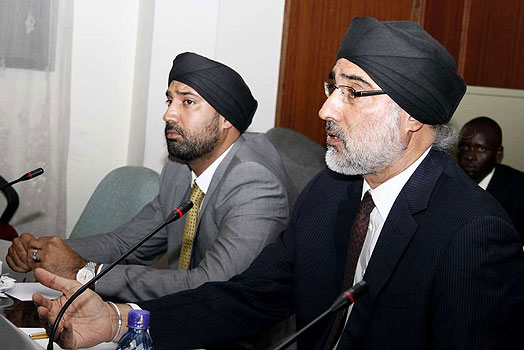Business
KENYA’S CEMENT SCANDAL: ‘Rai is the CHEAPEST & LOWEST QUALITY!’ – Alai Drops Bombshell as Engineers Fear Collapsing Buildings
The Institution of Engineers of Kenya (IEK) warned this week that up to 25% of cement sold in the country fails to meet quality standards, contributing to building collapses and compromised infrastructure.

Engineers and lawmakers sound alarm over quality control failures threatening construction industry
NAIROBI, Kenya – Kenya’s construction industry faces mounting scrutiny over substandard cement quality, with engineers and elected officials raising urgent safety concerns about materials flooding the market.
The Institution of Engineers of Kenya (IEK) warned this week that up to 25% of cement sold in the country fails to meet quality standards, contributing to building collapses and compromised infrastructure.
The alarm comes as Kileleshwa Ward MCA Robert Alai publicly criticized Rai Cement, calling it “of the lowest quality in Kenya” and demanding improvements.
The IEK’s May 28 statement highlighted a “worrying trend” of substandard cement in the market, with some cement bags weighing as little as 45kg instead of the standard 50kg, indicating potential adulteration or underfilling.
“When cement is compromised, life and property are directly at risk from compromised structural integrity,” said IEK President Kiteme, urging the Kenya Bureau of Standards (KEBS) to intensify market surveillance.
A 2022 KEBS internal report revealed that three out of five cement products tested failed quality standards, particularly for chemical composition and compressive strength.
The report identified poor-quality clinker, a key raw material, as a primary cause of substandard cement.
The Kenyan cement market, valued at $673 million in 2024, has experienced significant strain. Cement prices have surged 15-30% since 2022, with a 50kg bag now costing between KSh 720 and KSh 1,250, driven by a 17.5% import levy on clinker and rising fuel and electricity costs.
Market consumption declined 2.3% due to these cost pressures and supply chain disruptions. Insufficient domestic clinker production has further strained manufacturers, with locally produced clinker prices rising from $50 to $130 per ton.
These economic pressures may incentivize some producers to compromise quality to reduce costs, potentially explaining the prevalence of substandard materials.
The National Construction Authority (NCA) reported that between 2009 and 2019, 86 buildings valued at over KSh 2.4 billion collapsed due to substandard materials, including cement.
The problem particularly affects common-grade cement (32.5R), widely used in residential construction.
High urban housing demand has led some developers to cut corners, using inferior materials to reduce costs and maximize profits, further exacerbating the crisis.
Rai Cement under scrutiny
Rai Cement, a subsidiary of the Rai Group based in Nyanza province, has operated since January 2017, producing over 1 million tons annually.
The company markets its Dumu Cement brand as KEBS-certified and suitable for general construction.
MCA Alai’s recent criticism challenged the company’s reputation. Rai Cement has not publicly responded to the allegations.
The company previously emphasized its commitment to quality adherence and fair pricing, serving major infrastructure projects across the North Rift, South Rift, Nyanza, and Western regions.
In 2023, Rai Cement joined other manufacturers in opposing a proposed increase in clinker import duty from 10% to 25%, arguing it would drive up costs for companies relying on imported clinker.
The IEK has called for urgent action, including random sampling and product recalls to protect consumers.
KEBS faces pressure to conduct more rigorous market surveillance, while the NCA emphasizes the need for better regulation to prevent substandard materials in construction.
Industry stakeholders stress that with urbanization driving demand for housing and infrastructure, ensuring building material quality is paramount to safeguarding lives and investments.
Kenya Insights allows guest blogging, if you want to be published on Kenya’s most authoritative and accurate blog, have an expose, news TIPS, story angles, human interest stories, drop us an email on [email protected] or via Telegram
-

 Grapevine1 week ago
Grapevine1 week agoAlleged Male Lover Claims His Life Is in Danger, Leaks Screenshots and Private Videos Linking SportPesa CEO Ronald Karauri
-

 Lifestyle2 weeks ago
Lifestyle2 weeks agoThe General’s Fall: From Barracks To Bankruptcy As Illness Ravages Karangi’s Memory And Empire
-

 Grapevine5 days ago
Grapevine5 days agoRussian Man’s Secret Sex Recordings Ignite Fury as Questions Mount Over Consent and Easy Pick-Ups in Nairobi
-

 Investigations2 weeks ago
Investigations2 weeks agoEpstein Files: Sultan bin Sulayem Bragged on His Closeness to President Uhuru Then His Firm DP World Controversially Won Port Construction in Kenya, Tanzania
-

 Investigations2 days ago
Investigations2 days agoMulti-Million Dollar Fraud: Three Kenyans Face US Extradition in Massive Cybercrime Conspiracy
-

 Investigations2 weeks ago
Investigations2 weeks agoEpstein’s Girlfriend Ghislaine Maxwell Frequently Visited Kenya As Files Reveal Local Secret Links With The Underage Sex Trafficking Ring
-

 News2 weeks ago
News2 weeks agoState Agency Exposes Five Top Names Linked To Poor Building Approvals In Nairobi, Recommends Dismissal After City Hall Probe
-

 Business1 week ago
Business1 week agoM-Gas Pursues Carbon Credit Billions as Koko Networks Wreckage Exposes Market’s Dark Underbelly















